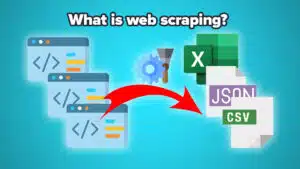How to Turn Off Extractors You Don’t Need and Handle Web Page Variations Better

Web scraping has quickly become an essential tool for both researchers and businesses due to its ability to help them pull useful data from websites that can then be put to use in many ways. Because extractors are responsible for deleting specific material from web pages, they play a very crucial role in this procedure. We will investigate extractors and discuss their role in web scraping applications.
This tutorial intends to provide the readers with a comprehensive understanding of the extractors and how they contribute to web scraping. In addition to discussing solutions for dynamic web page variations and extractor breakdown, we will proceed by explaining how the redundant removal of unnecessary scrapers or their equals may be an essential step that decreases the processing time required to operate on a website.
Understanding the Role of Extractors in Web Scraping
Extractors are tools or techniques used to pick out the specific data components from the web pages. They are a very critical part of web scraping projects because they allow the users to easily focus and extract the desired information. Extractor designs can also extract the various types of data – such as text, pictures, links, and structured forms of information like tables.

XPath, regular expressions, CSS selectors, and APIs are prevalent in web scraping projects. Regular expressions are very helpful tools for pattern matching and selecting text patterns from HTML or even text documents. To locate elements within an HTML document, you can use the XPath language which ‘navigates’ through the XML documents. One more popular approach to targeting specific elements based on their attributes or location within the HTML hierarchy is with CSS selectors. With the help of a particular defined set of features, APIs (Application Programming Interfaces) let the developers get data from websites.
The Need to Identify the Unnecessary Extractors in Your Scraping Project
Locating the unnecessary extractors is crucial to optimizing the effectiveness of your web scraping endeavor. The use of extractors can lead to the development of complex code, it also slows down the web scraping process and consumes more resources. What’s more important to understand is not only the structure of the pages you are scraping but also what information should be extracted to easily detect unnecessary extractors.
The analysis of your scraping code to identify the extractors that are either redundant or not used is another way for identifying unnecessary extracted. You can also check the extracted data for any redundant or unnecessary things that need to be eliminated. First, it is essential to consider how each extractor impacts the performance and determine if there are any benefits enough from this maintenance that make it worth keeping.
Measuring the Web Page Load Times Due to the Extractors
Big or complex web pages can also be significantly impacted by the extractors on how they load. Processing resources and time are required from each extractor to find and draw out the necessary data components. Thus, in order to ensure the optimum results, it is very essential to determine the impact of extractors on load times.
It is possible to measure the impact of extractors on the load times using a wide range of instruments and methods. One of the most popular ways to investigate network requests and load times is with browser developer tools such as Firefox Developer Tools or also Chrome DevTools. These tools demonstrate the speed of parsing and extraction from the websites for each analyzer.
Using the Extractor Management to Simplify the Web Scraping Process
A crucial part of an ideal web scraping process is efficient extraction management. Extractor management essentially includes organizing, classifying, and reusing the extractors in several scraping projects. This leads to better performance, while it also reduces the amount of work done twice and makes the data scraping uniform.
The systematic approach of managing the extractors appropriately is also very important. One recommendation concerns the creation of an accessible and reusable central repository or a library of extractors. This can easily be accomplished with the program version control systems that include Git or other extractor management tools.
Dealing with Dynamic Web Page Variations and Extractor Failures
Such changes in a dynamic website are very challenging to the extractors who work with the tasks referred to as web scraping. Changes in the structure, feel or content of Web sites occur often enough that it is tough for an extractor to locate and gather those data units required. In addition, the changes in the HTML structure or its elements’ properties could lead to an extractor not working properly.
It is important to have adaptive scraping solutions that can deal with extractor failures and website modifications. One solution is the use of strong extractors that are designed to address the changes in web page structure. Such as using the other dynamic XPath phrases can respond to changes in the positions or attributes of elements.
Best Practices for Handling Extractor Errors and Debugging Scraping Scripts
Most web scraping projects face many extractor errors due to a variety of factors such as wrong selection syntax, non-existent elements, or network issues. These issues determine the accuracy of the extraction and scraping script integrity that you maintain.

One good practice for overcoming the extractor problems is including error handling techniques in your scraping scripts. This might involve catching and managing specific types of problems with the try-catch blocks. A possible solution for such difficulties with the network is either making repeated requests or reporting an error to continue checking.
Tips for Optimizing Extractor Performance and Improving Scraping Results
Improving extractor performance is essential if you want to increase web scraping projects’ accuracy and efficiency. You may get better scraping results and maximize the efficiency of your extractors by adhering to a few guidelines and procedures.
Getting your scraping script to make fewer HTTP queries is one way to improve extractor performance. The latency and processing time of the network are increased with each request. You can decrease the total load on the server and enhance performance by concatenating many requests into a single request or by utilizing strategies like caching.
In a nutshell, extractors play a very crucial role in scraping projects since they create an environment that enables the users to successfully obtain specific data elements from the websites. By finding unnecessary extractors, analyzing their influence on the load times, managing workflows effectively for dynamic changes and failures occurrences without any malfunctions addition diagnosing issues that may arise as well, and increasing speed levels all these ensure greater productivity from your online scraping projects with better accuracy outcomes achieved. For your extractor management tactics to remain optimal and respond effectively as the web page structure variations occur, it is very important that you continuously evaluate them. Maximizing the efficiency of the extractors combined with using appropriate tools and procedures along with best practices could produce better-scraping results.

 Bill Yeager, Co-Owner of High Point SEO & Marketing in CT
Bill Yeager, Co-Owner of High Point SEO & Marketing in CT